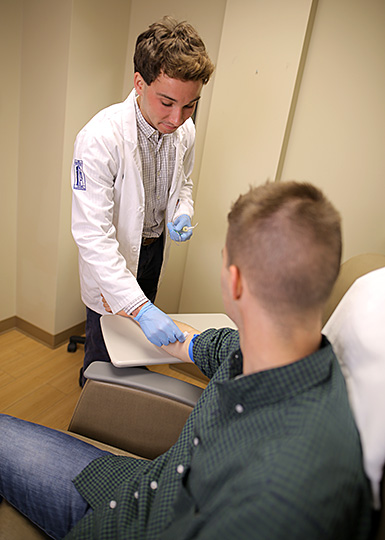Innovative research that may explain the precarious connection between lung cancer and serious blood clotting disorders has earned a University of Toledo medical student a fellowship with the North American Society for Thrombosis and Hemostasis.
Adam Meisler, who will be entering his second year of medical school, was one of only three students in the country to receive the 2019 award. The fellowship includes a $5,000 stipend and a $1,000 award to the lab.

Medical student Adam Meisler took a blood sample for his research focusing on the connection between lung cancer and blood clotting disorders. Meisler is one of three students in the country to receive a fellowship with the North American Society for Thrombosis and Hemostasis for his research.
Lung cancer patients have an elevated risk of strokes, heart attacks and pulmonary embolisms. Approximately one-fifth of the 150,000 annual deaths tied to lung cancer in the United States are the result of large blood clots.
Meisler’s project is focused on whether cancer-fighting T-cells bonding with blood platelets in those patients might explain why.
“We suspect that the interaction between platelets and T-cells is largely contributing to that phenomenon,” Meisler said. “If we can find a way to break up those aggregates, I think that would be huge.”
In healthy individuals, a relatively small portion of T-cells are attached to blood platelets — somewhere around 15 percent. However, in lung cancer patients, Meisler and Worth have found as many as 65 percent of their T-cells are bonded with platelets.
Worth said science has already shown that a portion of lung cancer patients who have had a stroke or heart attack don’t respond to the normal anti-coagulants that would be prescribed to prevent a second event.
“There’s a big push from the National Cancer Institute and the National Institute of Heart, Lung and Blood trying to understand why that is,” Worth said. “I think with these platelet T-cell aggregates, we may have discovered the time bomb.”
With the fellowship, Meisler will continue his research and present his findings at the North American Society for Thrombosis and Hemostasis conference next spring.
“To apply my research to something as high impact as lung cancer is really special,” Meisler said. “This project and the fellowship is definitely making me lean toward a future specializing in hematology-oncology.”